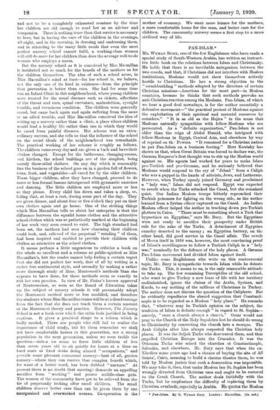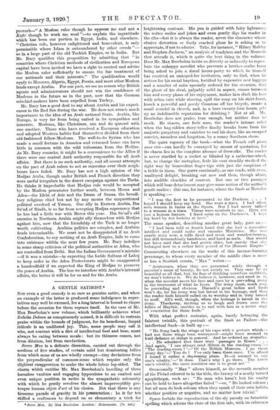PANISLAM.*
Ma. Wyswr BURY, one. of the dew Englishmen who, have. made a special. study of South-Western Arabia, has written, an instruct- ive little book on, the relations between Islam and Christianity. He holds that there is no inevitable antagonism between, the two creeds, and that, if Christians did not interfere with Moslem institutions, Moslems would not show themselves actively hostile to Christians. He has a strong objection to the " swashbuckling " methods adopted by the directors of certain Christian missions—American for the most part—in Modem countries, because he thinks that such methods provoke an anti-Christianreaction among the Moslems. PanIslam, of, which we hear a good deal nowadays, is for the author essentially a defensive movenient--" the practical pretest of Moslems against the exploitation of their spiritual and material resources by outsiders." " It is as old as the Hejira " in the sense that Moslems naturally sympathize with fellow-Moslems who are persecuted. As a " definite organization," Pan-Islam is. not older than the reign of Abdul Hamid, who intrigued with fellow-Moslems in Egypt, Central Asia, and elsewhere by way of reprisal on th,2 Powers. "It remained for a Christian nation to put Pan-Islam on a business footing." Herr Kautaky has shown us that, when Great Britain was forced to declare war, the German Emperor's first thought was to stir up the Moslem world against us. His agents had worked, for years to make. Islam pro-Turkish and pro-German, and he seriously believed that Moslems would respond to the cry of "jehed " from a Caliph who was a puppet in the hands of atheists, Jews, and Lutherans. However, when Turkey openly joined Germany and proclaimed a " holy war," Islam did not respond. Egypt was expected to revolt when the Turks: attacked the Canal, but she -remained quiet. Our Indian Moslem troops, bitterly reproached their Turkish prisoners for fighting on the wrong, side, as, the author learned from a Syrian officer captured. on. the Canal. An Indian Moslem officer helped the author in tracking down pro-Turkish plotters in Cairo. " There must be something, about. a Turk that hypnotizes an Egyptian," says Mr. Bury. But the Egyptians were, not ready to sacrifice their prosperity under British rule for the sake of the Turks. A detachment of Egyptian camelry deserted to the enemy ; an Egyptian battery, on the other hand, did good service in the Canal affair. The revolt of Mecca itself in 1916 was, however, the most convincing proof of Islam's unwillingness to follow a Turkish Caliph in a " holy war," nominally for the defence of the holy places. A German Pan-Islam movement had divided Islam against itself-
Unlike some Englishmen who write on this controversial topic, Mr. Bury is sympathetic: towards Islam while lie detests the Turks. This, it seems to us, is the only reasonable attitude to take- up. The few remaining Turcophiles of the old school, who want to give Turkey a new lease of life with her territory undiminished, ignore the claims, of the Arabs, Syrians, and Kurds, to say nothing of the millions of Christians in Turkey. The author does not discuss the question of the Caliphate. But he evidently repudiates the absurd suggestion that Constanti- nople-is to be regarded as a Moslem " holy place." He remarks that, " whatever may be- Turkish opinion on the subject, the tradition of Islam is definite enough " in regard to St. Sophia— namely, " once a church always a church." Omar would not pray_ in the Church of the Holy Sepulchre lest he should do wrong to Christianity by converting the church into a mosque. The Arab Caliphs after him always respected the Christian holy places. It was the Seljuk Turks who desecrated them, and thus impelled Christian Europe into the Crusades. It was the Ottoman Turks who seized the churches at Constantinople, Salonika, and elsewhere. Mr. Bury say& that when the ex- Khedive some years ago had a chance of buying the site of All Saints', Cairo, meaning to build a cinema theatre there, he was told by Moslem jurists that such- a desecration was impossible. We may take it, then, that under Moslem law St Sophia has been wrongly diverted from Christian uses and ought to be restored to the Greek Church. The author deals faithfully with the Turks, but he emphasizes the difficulty of replacing them by Christian overlords, especially in Arabia. He quotes the Moslem
• Pan-Dims. By G. Wyman Bury. London : Macmillan. [3a. net.] proverb—" A Moslem ruler though he oppress me and not a Kafir though he work me_ weal "—to explain the ingratitude which has been our portion in Egypt, India, and elsewhere. " Christian rule, however enlightened and benevolent, is only permissible where Islam is outnumbered by other creeds "- as in a large part of the old Turkish Empire, or in India. But Mr. Bury qualifies this proposition by admitting that " in countries where Christian methods of civilization and European capital have been invited we have a right to control and advise the Moslem ruler sufficiently to ensure the fair treatment of our nationals and their interests." The qualification would apply to Morocco, Algeria, Egypt, Persia, and most other Moslem lands except Arabia. For our part, we see no reason why British agents and administrators should not win the confidence of Moslems in the future as in the past, now that the German mischief-makers have been expelled from Turkey.
Mr. Bury has a good deal to say about Arabia and his experi- ences in the Red Sea during the war. He does not attach much importance to the idea of an Arab national State. Arabia, like Europe, is very far from being united in its sympathies and interests. Moslems, like Christians, can and do quarrel with one another. Those who have received a European education and adopted Western habits find themselves divided from their old-fashioned fellow-Moslems. The well-to-do Syrian who has made a small fortune in America and returned home can have little in common with the wild tribesman from the Hedjaz. As Mr. Bury remarks, it might be a convenience to the Allies if there were one central Arab authority responsible for all Arab affairs. But there is no such authority, and all recent attempts on the part of Arab rulers to act as suzerains over their neigh- bours have failed. Mr. Bury has not a high opinion of the Hedjaz Arabs, though under British and French direction they were useful irregulars in the desert campaign against the Turks. He thinks it improbable that Hedjaz rule would be accepted by the Moslem potentates further south, between Mecca and Aden—the Idrisi of Asir and the Imam of Sanaa, the heredi- tary religious chief but not by any means the unquestioned political overlord of Yemen. Our ally in Eastern Arabia, Ibn Sa'ud of Riadh, is so far from accepting Hedjaz supremacy that he has had a little war with Mecca this 'year. Ibn Sa'ud's old enemies in Northern Arabia might ally themselves with Hedjaz against him, now that the friendship of the Turk is no longer worth cultivating. Arabian politics are complex, and Arabian feuds interminable. We must not be disappointed if an Arab Confederation, to say nothing of an Arab Empire, fails to come into existence within the next few years. Mr. Bury indulges in some sharp criticism of the political authorities at Aden, who are controlled from Delhi. But the Indian Government's mistake —if it was a mistake—in expecting the feeble Sultans of Lahej to keep order in the Aden Protectorate might be exaggerated a hundredfold if we expected the King of Hedjaz to preserve the peace of Arabia. The less we interfere with Arabia's internal affairs, the better it will be for us and for the Arabs.











































 Previous page
Previous page